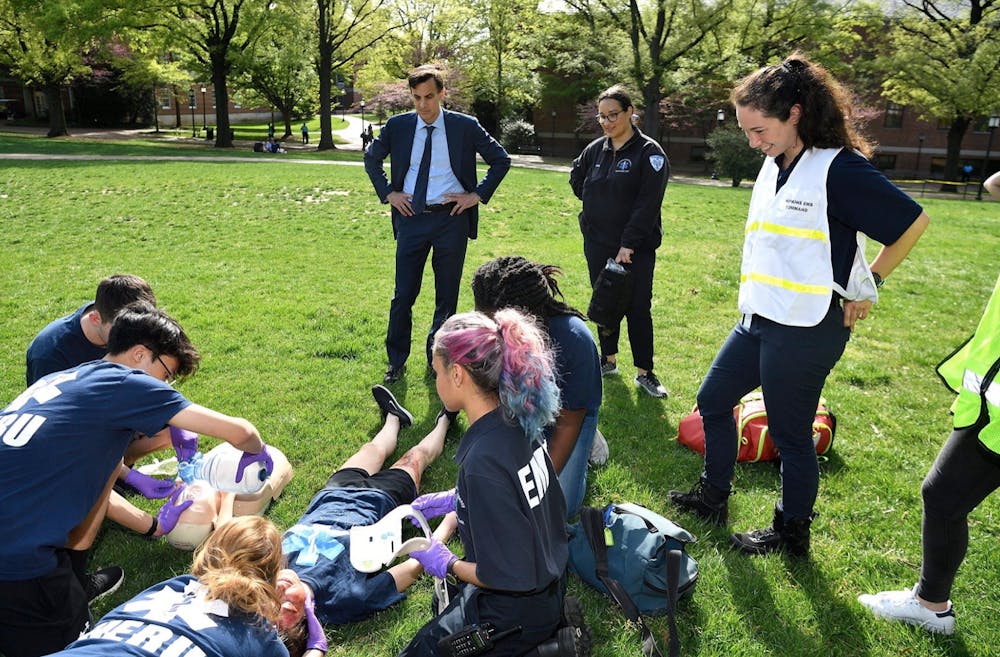After pausing its operations during the fall semester, the Hopkins Emergency Response Organization (HERO) resumed activities for the spring on Feb. 2. HERO is the University’s student-run, professional emergency medical services organization. It operates as a 24/7 response service, with the Hopkins Emergency Response Unit branch tasked with providing patient care.
Captain Erik Pan, a junior, stated in an interview with The News-Letter that HERO is now equipped to medical emergencies related to COVID-19 on campus.
He explained that for non–COVID-19 cases, emergency medical technicians (EMT) need to wear at least an N95 respirator or higher respirator, a face shield and one set of gloves. For cases with suspected COVID-19 exposure, EMTS must also wear a trauma gown and another set of gloves.
Pan also emphasized that all EMTs make sure to social distance while using their squad rooms.
“We’re even more strict to ensure our members’ safety first and foremost,” he said. “I have every confidence in our unit to keep ourselves and the community safe.”
Since HERO began operations last Tuesday, responders have yet to receive any COVID-19 calls, according to Pan.
HERO abides by the Amnesty Policy under the protocols of the Maryland Institute for Emergency Medical Services Systems. Consequently, while Pan stated that he cannot provide information related to the alleged parties on campus, he called on all students to abide by University guidelines.
Pan highlighted that HERO has been one of the biggest parts of his Hopkins experience. He became interested in EMT work after he witnessed his father suffer a medical emergency when he was 16.
“At that time I had no medical training, and I just felt helpless. I signed on to take an EMT class and ran with my local rescue station to get a feel of it. When I was 17, I got my New Jersey EMT license and started operating in my town,” he said. “I found that I loved the work and the people.”
He stressed that while his position as captain comes with many responsibilities, he manages his work-life balance well.
“This week, since a lot of our members are still out, I’m taking approximately 50 hours on duty... That’s not the typical norm; it’s probably the highest I’ve ever worked,” he said. “But even with 50 hours on the board, I’ve had no trouble maintaining my academic life. It’s really the community of HERO that helps support each other.”
Recruitment and Retention Officer Anthony Garcia, a sophomore, explained that Hopkins gives EMT workers leeway with scheduling their academic responsibilities.
“Our personal officer makes sure we work at least four hours a week,” he said. “It’s doable, especially since we have a large body and are currently building that backup. When we’re at full capacity, it’s pretty balanced among all of us, and we never have to prioritize HERO over our academic jobs at Hopkins.”
Garcia’s favorite memory at HERO was taking the EMT training course during Intersession 2020. Although the course consisted of three weeks of 12-hour classes, he asserted that students never felt overwhelmed by the workload.
“It’s a lot, but it’s something that everyone is so passionate about that you can’t help but feel excited because you’re constantly around the energy of everyone who wants to do their best,” he said. “You can lean on each other and get so much closer to people.”
Pan underscored that he is grateful for the community and family that he has built with his fellow EMTs.
“Aside from the more interesting calls that we received on campus, which I cannot talk about on the record because that would be breaking the law, my favorite memories have been getting to spend time with all the people who share the same passion for lending a hand in people’s darkest moments,” he said. “Being around people who feel that same way develops a camaraderie that I haven’t found in a lot of different places in my life.”
HERO training officers are all certified EMTs. New members who are not previously certified are required to complete the Maryland EMT course arranged by HERO, which is held during Intersession.
Garcia explained that recruitment for HERO usually takes place entirely during the fall semester. Because all activities were virtual and HERO was unable to continue its training for new members without EMT licenses, they accepted only students who were already licensed. HERO applications are now open for the spring semester.
“We’re looking from a holistic viewpoint. We want to know that our members are dedicated and have a big heart,” Garcia said. “The biggest advice we give all applicants is to be themselves. We want to see the true side of them and get the most dedicated group of kids possible.”
HERO members without EMT licenses who are accepted this spring will have to complete the EMT training in August. HERO partners with the Hopkins Lifeline, a paramedic transport team, to conduct the training.
In addition, HERO operates in partnership with Lifeline’s Critical Care Transport Team, Campus Safety and Security and the Student Health and Wellness Center.
“We’ve overseen by Dr. Kessler, medical director of Student Health and Wellness. We work closely with them to develop protocols and make sure they’re up to standards,” Pan said. “We also get them run by risk management, who approves all our big decisions and protocols. We work very closely with the University to make sure there’s good cohesion with our operations and communications.”
Moving forward, Pan described HERO’s plans to offer classes to those on campus about basic emergency life saving procedures, such as CPR and bleeding control classes. HERO members hope to work on these initiatives once the public health situation permits.
For crisis and emergency support, HERO can be contacted through Hopkins Security’s 24/7 hotline at (410) 516-7777.
Correction: The original version of this article attributed one of Garcia’s quotes to Pan.
The News-Letter regrets this error.

















